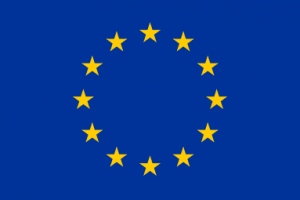The Liceo Scientifico Einstein is carrying out an interdisciplinary curricular activity about the physics of complex systems and creative writing, co-designed by two secondary teachers and inspired by Fedora’s themes and principles. The activity, named Kairos, shares the "same philosophy" of a previous one, “Physics of clouds”: create a space to make students reflect on themselves and on their identities as members of a complex society.
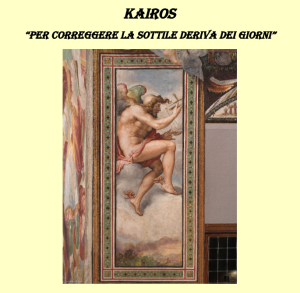
The founding idea and motif of the activity concerns contemporary society, which has been defined by Rosa the “society of acceleration”, since the speed with which the changes take place at different levels (social, economic, cultural, technological...). People are asked to reflect on the continuously evolving relationship between themselves and time, and how an accelerated time affects the ways in which individuals build their own experience. This complex intertwining between time, individuals, and society is the protagonist of the activity. Students are guided to explore time and its complex features as physical and anthropological categories. The complex relationship, which comes to life in an interdisciplinary literature-science context, is populated with meaning coming from the physics of complex systems and from the time conceptions of ancient Greeks (Chronos, Aios, Einautos, Kairos). The science of complex systems provides words and concepts such as uncertainty, unexpected, disorder, contradiction, possible scenarios, the interweaving of individual and collective, changes in spatial and temporal scale, and management of "different times", that can scaffold the thinking and help to better grapple with the “time-features” of contemporary society. Also the Greek conceptions of time shed light on these “time-features” but they also open a reflection on an anthropological perspective: as Seneca wrote - “Tempus tantum nostrum est” - namely our domain on time can be conceived as a capacity for qualitative and non-quantitative choice in relation to time. Hence the title of the project, Kairos: alongside the quantitative time of regular flow (Chronos), the eternal time (Aion), and the circular time (Einautos), there is qualitative time (Kairos) that incorporates a tension between present and future, a “hic et nunc” (here and now) that extends over time without losing the value of the present moment. Kairos embodies the educational purpose of the activity: to know and choose a good time, the ethically appropriate opportunity in a simple flow of individual and social existence together. Students are fostered to reflect and explore the physical and anthropological categories of time and their complexities by writing a collective theatre pièce. The writing is the “place” where the merging of Greek times and science of complexity is realized, with the scaffolding of narrative rules.
Kairos was born from the collaboration between the professors Sara Moresco (Italian literature teacher) and Paola Fantini (retired math and physics teacher), with the help of professor Nicola Ialeggio (in-service physics teacher), Emma Gabellini (responsible for the school chemistry laboratory), Veronica Ilari (master student involved in the FEDORA project), Francesco De Zuani (PhD student involved in the FEDORA project). The teachers chose to use curricular hours of Italian literature (about 50), since they wanted to create dynamics involving all the students and push for the activity to become structural in the next years, even if this brought huge challenges in fitting the Italian curriculum according to the activity.
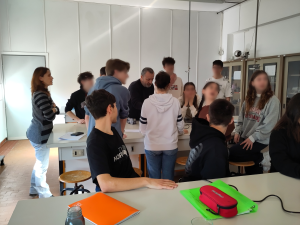
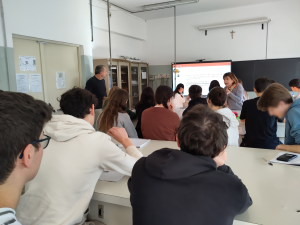
The activity consisted of 4 phases.
In the first one prof. Fantini presented in class examples of complex systems, describing their novel features compared to classical systems, and stressing the idea that society itself can be considered a complex system, so can be looked at through the “lenses” scientists use to address complex systems.
The next phase is composed of two laboratory experiences: i) one within the chemistry laboratory, where Prof. Gabellini showed a chemical oscillatory reaction; ii) one within the physics laboratory where Prof. Ialeggio helped students to reproduce the Bènard cells effect. The aim was to show temporal and spatial structures that were emerging from the microscopic interaction of system agents, a concept discussed previously in class. Some of the ideas at the basis of these two first steps come from the Educational Reconstruction made by Veronica Ilari in collaboration with Francesco De Zuani.
In the third step prof. Fantini and prof. Moresco displayed to students how to connect the physics concepts encountered with the language of writing; specifically, they chose to exploit the four kinds of “time” that ancient Greeks had (Kairòs, Aiòn, Einautòs, Chrònos) since the features which distinguish them are features which emerge in the discourse about complexity (circularity, determinism, emergence…). These features were addressed while writing by using Pirandello’s conception of comic and humorous.
Finally, the students were asked to write a theatre pièce made of 5 acts, each of which was assigned to a group of students. In the writing of the piece, students were asked to respect some constraints including dealing with the management of different temporalities. Professor Moresco is mentoring the writing process, editing the scenes, and also involving the whole class in deciding title, settings, characters, and so on.
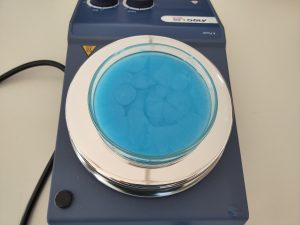 Hence, the objective of Kairos was to construct some lenses from the physics of complexity, by which being able to look at a world that is complex, to see how individuals are agents within a society that has circular causal mechanisms and emergent phenomena, develop ways, by the use of writing, to make sense of the complexity around and develop our identity as agents within that.
Hence, the objective of Kairos was to construct some lenses from the physics of complexity, by which being able to look at a world that is complex, to see how individuals are agents within a society that has circular causal mechanisms and emergent phenomena, develop ways, by the use of writing, to make sense of the complexity around and develop our identity as agents within that.
